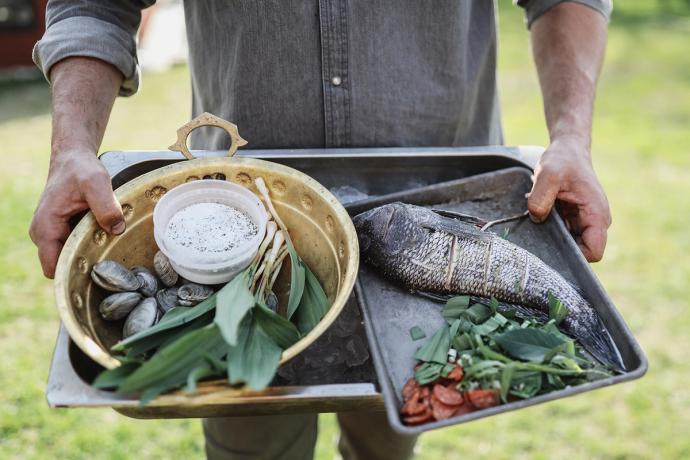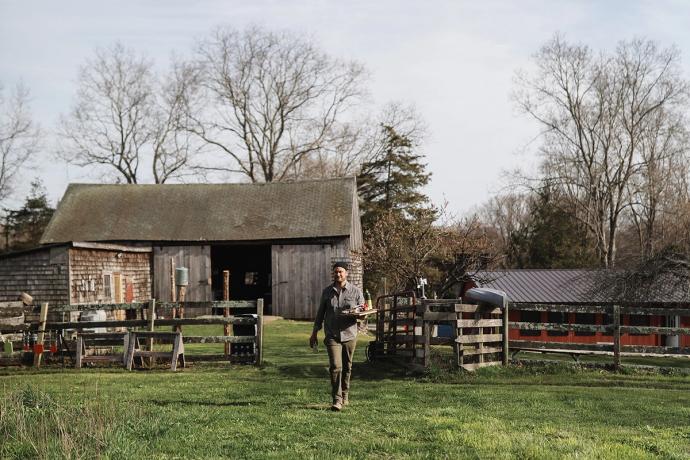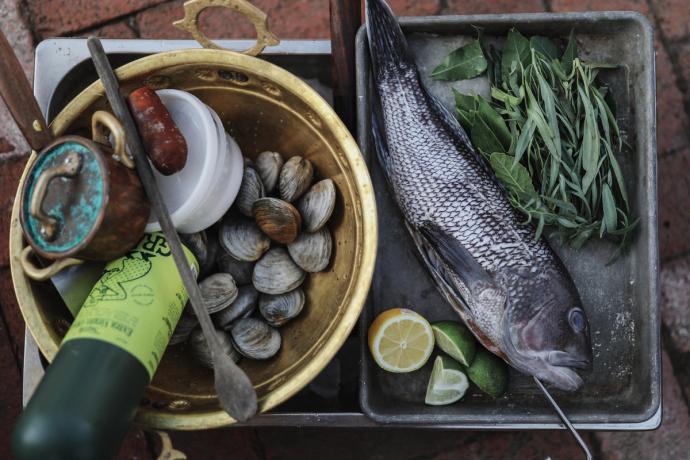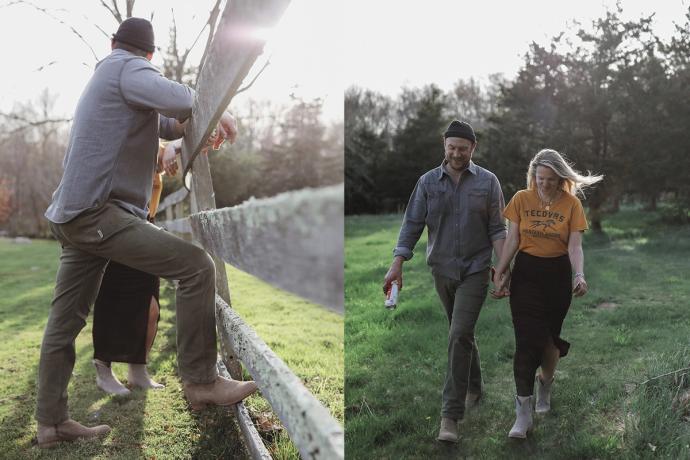
It seems appropriate to open an interview with a Deadhead by citing Jerry Garcia, who once said, “You don't want to be the best at what you do. You want to be the only one.” And, to me, this sums up what makes Brad Leone so successful.
He’s built his career on his prowess in the kitchen, his willingness to make mistakes in the kitchen, learn new things, and be a poster child for unpretentiousness. It’s attractive, and he has the audience to match. And, per Jerry Garcia, it makes him wholly unique. You can make a lot of comparisons in the culinary world (I like to think of Gordon Ramsay as the John McEnroe of the kitchen), but not many people would argue that Brad Leone is the Brad Leone of his industry. Even Brad himself has trouble coming up with a job description:
“I host videos. I wrote a cookbook. I have recipes. I collaborate and make content with a lot of really cool people. But what is that? Is that a chef? It's hard to fill out the paperwork sometimes. I don't know what the hell to write,” he told me.
As it turns out, it doesn’t really matter, but it does give a glimpse into Brad’s world, a mixture of fine-dining, farming, gardening, and generally being curious about the things around us. So, in that spirit of curiosity, I had the chance to catch up with Brad on a day off to explore his life as a hunter, angler, cook, and most recently, farm owner.
Here’s the difficult-to-describe Brad Leone.

Steve: How was your hunting season?
Brad: Overall, it was a good year for me. I got two really nice does in the first week of rifle season. I wish I got something with the bow, but I got them with my favorite gun, this old .303 from World War I or World War II. It’s just a solid, old, iron-sight rifle. That was awesome. Then, I was fortunate to do a hunt with YETI and some friends down in New Mexico. I got my first elk, which was great.
When did hunting and fishing enter your life and how did they interact with cooking as you built your career?
Hunting and fishing were introduced to me pretty early, fortunately. It’s funny. When I tell most people what I was exposed to growing up in New Jersey, they're like, "What are you talking about?" My dad was — still is, he's not dead or anything — a pretty cool, unique dude. He exposed me to a lot of fun stuff, like freshwater fishing and saltwater fishing, especially as I got a little older. He started me young, just being in the woods, going for snapping turtles and making soup out of them, frogging to make frog legs. That was really cool. He started me on squirrel hunts, rabbit hunts, and then introduced me to archery and firearms, and taught me to have a massive respect for them. Now, having two sons, I’m trying to do my best to pass that on to them.
The cooking came naturally, too. My parents didn't have a lot of money, but they grew some good produce in the summer. What they did buy from the supermarket was whatever the manager had on special for chicken breasts or whatever the hell it was. But, most importantly, both my parents had their dishes and I always had a home cooked meal. Whether it was meat or sweet potatoes or my mom's soup, it was never a frozen brick. I was really fortunate to be in a family that ate dinner together, and cooked. I mean, that’s some core memory shit, now that I think back on it. This is going to turn into a therapy session [laughs]. Having them always cooking, and gardening when you're young, it just becomes part of your DNA.




When you moved into the culinary scene, I’m assuming not many of your peers grew up eating turtles and gigging frogs. How did that affect your approach to food?
Good question. The boring answer is just having an open mind to ingredients that maybe might seem really odd or unusual to eat or cook with. Listen, some things suck, but some of those things are really delicious. It’s about being adventurous and trying new things, having an open mind, which I think is just super important in the culinary space.
Speaking of being adventurous, let’s talk about your farm.
It’s in a place called North Stonington, right on the border of Rhode Island between Cape Cod and Montauk. It's a really awesome, unique spot with great hunting, fishing, both freshwater and saltwater. As for the house, my whole life I always said, "I'm never buying an old house. There’s nothing but problems with it.” And then I ended up buying the oldest house in America. [Laughs] It's ridiculous. It was built in the 1750s, an old farmhouse with a little under 10 acres of manicured land that they used to run animals on. There are a couple orchard trees. The house has an old stone fireplace that’s the centerpiece and every room's got a little stone fireplace. None of the floors are flat, but it's cool. It's cozy. It's home. It’s the first house I ever bought, and it’s cooler than the one I grew up in.

What has that transition been like for you, moving out of the city?
We're just now settling in. We've been there for one year and it’s been busy, but we’ve gotten a lot done. We're getting the garden squared away. Everything's a full-time job. I wish I was rich. I would just work on it all the time. Well, I guess if I was rich, I'd pay other people to do it, but you know what I mean. It’s nothing but work and it beats the hell out of you. I heat the house with wood, so I'm out there running chainsaws and log splitters. I'll be dialed in and have everything zippered up by September, come serious hunting and fishing time. We’ll go through 10 or 11 cords a winter, so I need to have that shit caught up and squared away and ready to go, so I'm not messing around come fall.
How has living at your place affected the way you cook?
It fluctuates. We've only been here for a year, but it's been a really good year, and this spring and summer we're really going to get the vegetables. Last year we had so many tomatoes, so I was canning them, and catching fish with my friends and canning them in the pressure canner. This year, our garden's going to be a little bit bigger, and a little more organized, and I’ll be able to stop the animals from getting in there. Between the wild game, oysters, scallops, crabs, and all types of fish, it's amazing. I'm easy, man. Less is more. Give me some rice and some good veggies, some fermented stuff, and a really nice protein, and I can eat that all the time.

From an outsider’s perspective, you seem like a guy who is unapologetically himself. Has that been a challenge for you at all as a chef?
I don't consider myself a famous chef or anything. I'm a curious traveler, just like everyone else, and I just happened to get lucky and find an outlet that matches my skill set. But, I’m no expert in any category. I never tried to be or wanted to be. Why people found my videos and content and personality attractive was because I think I’m approachable. Listen, if you want to learn from me, great. But, I am by no means a professor. It’s been fun. It's also been challenging.
So, if you don’t call yourself a chef, what do you call yourself?
I mean, listen, I can cook. I can cook for a lot of people. I cook for my family. I also keep things very simple with a lot of things I cook at home. I know a lot of people who are way better cooks than me. For me, a chef is someone who is running a kitchen or a program, you know what I'm saying? Writing menus, running a crew, and putting on a service of some sort. I'm not doing that. I’ve been asked, but I’ve never been a head chef anywhere. I got into the culinary field wanting to do something other than restaurants. I like cooking, but I mess things up all the time.
We just met, but I’m assuming you write for a living. So by trade, you're a writer. Who the hell am I? I host videos. I wrote a cookbook. I have recipes. I collaborate and make content with a lot of really cool people. But what is that? Is that a chef? It's hard to fill out the paperwork sometimes. I don't know what the hell to write.
Does it matter?
I guess not. Yeah [laughs].

For someone who has trouble coming up with a job description, you certainly have an audience. If you could choose, what would you want them to take away from you?
That's a tough one. In general, I really care about teaching kids about food. I think that's super important. Thinking back on it, that’s one of the reasons I took a loan out, moved to Brooklyn, and went to culinary school. Naively, I wanted to teach kids about food. I would still like to do that down the line, whether it's a show or books or whatever. Cooking as an adult is cool, but having a kid grow a tomato themself and then taste it with a little bit of salt, that's some life-changing stuff.
To me, it’s all about the ingredients. It’s all about experiencing a fresh green bean that was grown organically, properly — even that cool flower that comes off of the plant. That’s it. I don't need to do big, fancy things, other than just highlighting the ingredients. And that’s one of the reasons I wrote my book. I may not blow anyone’s mind, but I can write some recipes. There are a couple really good ones. But, ultimately, I just love cooking. It's fun, and I really like eating, so that always helps.
Photos by Maaike Bernstrom - @maaikephoto
Words by Steve Schwartz